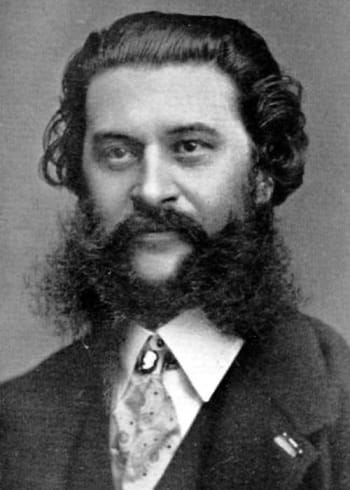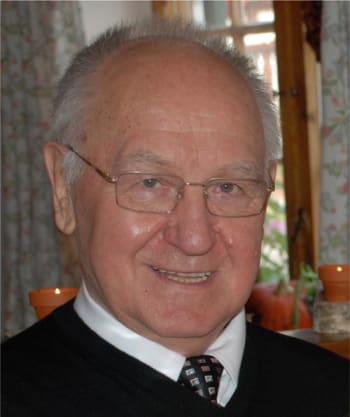
This Media Center item can only be displayed if you agree to the use of marketing cookies. With one click you can accept it.
Spanischer Marsch
Info
Notes available at:
https://www.rundel.de/en/
op. 433
Spanish March · Marche espagnole
Johann Strauss II, best known as the “Waltz King”, also composed a few marches. He dedicated a whole series of pieces of this genre to certain countries and their monarchs: the “Persian March op. 289” (1864), the “Egyptian March op. 335” (1869), the “Russian March op. 426” (1886) and finally the “Spanish March op. 433” (1888). The latter was dedicated to the regent of Spain, María Cristina (1858-1929).
The “Spanish March” was composed on the occasion of a planned concert tour of the composer through Spain, which then was canceled. Strauss, who didn’t like long journeys, preferred to avoid the long trip and instead sent his musical greetings to Madrid. As a “reward”, María Cristina awarded the composer the Grand Cross of the Order of Isabella. The work was first performed in Vienna on October 21, 1888, conducted by his brother, Eduard Strauss.
It is a long, dramatic and artistically crafted march, which spreads typical “Spanish” color in terms of melody and shape, even though the themes all come from Strauss himself. After a dignified introductory fanfare, small formal parts alternate with each other, which on the one hand have a folkloric-dance and on the other hand a longing-elegiac character. The “Spanish” coloration becomes evident, among other things, through the use of the Spanish “national instrument”, the castanets. The march is often performed at the Vienna Philharmonic’s New Year’s Concert.
Grade Level GB: 6-7
Grade Level USA: 4 (Advanced)
Composer: Strauß (Sohn), Johann
Arranger: Schwalgin, Stefan
Genre: Classic, Classical Transcription, Concert March, March
Performance time: 00:05:20
Publisher: Rundel
Size: A4
Info: Full Score + Condensed Score + Parts
Rundel Order Number: MVSR3449
Release Date: 2023
https://www.rundel.de/en/
op. 433
Spanish March · Marche espagnole
Johann Strauss II, best known as the “Waltz King”, also composed a few marches. He dedicated a whole series of pieces of this genre to certain countries and their monarchs: the “Persian March op. 289” (1864), the “Egyptian March op. 335” (1869), the “Russian March op. 426” (1886) and finally the “Spanish March op. 433” (1888). The latter was dedicated to the regent of Spain, María Cristina (1858-1929).
The “Spanish March” was composed on the occasion of a planned concert tour of the composer through Spain, which then was canceled. Strauss, who didn’t like long journeys, preferred to avoid the long trip and instead sent his musical greetings to Madrid. As a “reward”, María Cristina awarded the composer the Grand Cross of the Order of Isabella. The work was first performed in Vienna on October 21, 1888, conducted by his brother, Eduard Strauss.
It is a long, dramatic and artistically crafted march, which spreads typical “Spanish” color in terms of melody and shape, even though the themes all come from Strauss himself. After a dignified introductory fanfare, small formal parts alternate with each other, which on the one hand have a folkloric-dance and on the other hand a longing-elegiac character. The “Spanish” coloration becomes evident, among other things, through the use of the Spanish “national instrument”, the castanets. The march is often performed at the Vienna Philharmonic’s New Year’s Concert.
Grade Level GB: 6-7
Grade Level USA: 4 (Advanced)
Composer: Strauß (Sohn), Johann
Arranger: Schwalgin, Stefan
Genre: Classic, Classical Transcription, Concert March, March
Performance time: 00:05:20
Publisher: Rundel
Size: A4
Info: Full Score + Condensed Score + Parts
Rundel Order Number: MVSR3449
Release Date: 2023
Recommended Articles
Spanischer Marsch
op. 433
Johann Strauss II, best known as the “Waltz King”, also composed a few marches. He dedicated a whole series of pieces of this genre to certain countries and their monarchs: the “Persian March op....Concert Band
MVSR3449
Recommended Persons
Johann Strauß (Sohn)
* 25.10.1825† 03.06.1899
Johann Strauß (Sohn), am 25.10.1825 in Wien geboren, nahm heimlich Musikunterricht, da sein Vater dies nicht wollte. Seine Mutter half ihm dabei. Mit seiner Kapelle, die er 1844 gründete, wurde er direkter Konkurrent seines Vaters. Als sein Vater starb, führte er die beiden Orchester zusammen und erlangte mit dieser Besetzung große Berühmtheit in ganz Europa. Von 1863...Info
Siegfried Rundel
* 27.04.1940† 09.04.2009
Siegfried Rundel was born in Bußmannshausen on April 27, 1940. His fascination and natural talent for music showed from an early age. He played the trombone in the community band and tried first compositions and arrangements as a teenager. His teachers were pioneers of the German wind band development, such as Hans Feliy Husadel, Gustav Lotterer und Hellmut Haase-Altendorf. Siegfried Rundel...Info
Media center
RUNDEL VIDEO
Persischer Marsch
Notes available at:
https://www.rundel.de/en/
op. 289
Persian March
Marche persane
In 1864 Johann Strauß (son) (1825-1899) wrote some...
RUNDEL VIDEO
Festmarsch
Notes available at:
https://www.rundel.de/en/
op. 452
Festival March
Marche de fête
Johann Strauß (son) (1825-1899)...
https://www.rundel.de/en/
op. 452
Festival March
Marche de fête
Johann Strauß (son) (1825-1899)...
RUNDEL VIDEO
Reitermarsch
Notes available at:
https://www.rundel.de/en/
op. 428
Cavalry March
Marche des cavaleries
Johann Strauß’...
https://www.rundel.de/en/
op. 428
Cavalry March
Marche des cavaleries
Johann Strauß’...
RUNDEL VIDEO
Rosen aus dem Süden
Notes available at:
https://www.rundel.de/en/
Walzer, op. 388
Roses from the South (Waltz)
Les Roses du Sud (Vals)
Johann...
https://www.rundel.de/en/
Walzer, op. 388
Roses from the South (Waltz)
Les Roses du Sud (Vals)
Johann...



